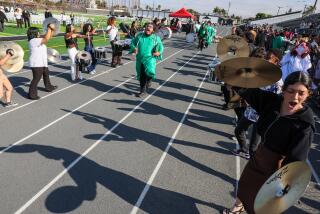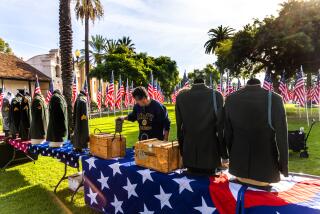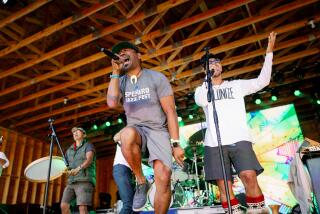Civil Suited : In âHonor and Glory,â Americus Brass Musicians Re-Create the Sounds and Sights of an Authentic Wartime Regiment Band
Other bands impersonate the Fab Four. Elvis imitators are a dime a dozen.
The Americus Brass Band, which brings âHonor and Glory: Civil War Memoriesâ to Orange Coast College in Costa Mesa on Sunday, marches to the beat of a different drummer: It aims for a historically accurate portrayal of the 4th Georgia Infantry Regiment Band.
âThe 4th Georgia was a town band founded in Americus, Ga., in 1860, one of just two Confederate bands to remain intact throughout the war,â said Kurt Curtis, president of the band. âAll of our instruments are authentic, made in the 1860s. The uniforms are replicas of those worn by the original band.
âEven the names of the characters are original, and weâve done research so that we know their occupations,â Curtis said. âThey were townsfolk, butchers, doctors. My particular character was a dentist. We have original letters, and we use them in the show. We even have reviews of the original band from the Augusta Chronicle.â
So how was the real thing?
âThe original Americus Brass Band was a typical town band before getting caught up in the war movement,â he said. âFor a town band they were (apparently) a strong band, a real fine ensemble--but in all honesty not as strong as this group today. They were townspeople; weâre professional musicians.â
The Americus redux bandâs two-act show features 14 musicians and three actors. It was formed in 1976 by students at Cal State Long Beach. Civil War re-enactments had been big for years, and the ensemble built its reputation by appearing at events such as the 125th anniversary of the famous 1863 battle at Gettysburg.
The band since been featured on the movie soundtracks for the four-hour âGettysburg,â the Oscar-winning âGloryâ and âGeronimo.â The group appeared on-screen for the ABC miniseries âNorth and South.â
*
Much of the music the band plays was found in the Library of Congress. Members have also turned up two songs written specifically for their progenitors, âSumpter Light Guard Marchâ and âAmericus Quick Step.â Band parts were not found, but arrangements were made from original piano scores.
âThis was called the singingest war,â Curtis said. âThe bands were extremely important, as a motivational force when marching, when the troops just wanted to hear pretty songs in camp like âHome Sweet Homeâ and to get them into formation when they fought.
âSo many songs were written about and during the war, everything from âAmazing Graceâ to âGoober Peas,â and they really strike home. They capture the feeling of war and sadness. Many carried on into World War I and World War II.â During the Civil War, instruments such as the E-flat and B-flat cornets, alto, tenor and baritone horns, B-flat and E-flat basses (basically tubas), were redesigned to point backward over the playersâ shoulders so that troops marching behind could hear more clearly. The instruments existed in both forms: over-the-shoulder, also known as backfire, and bell front.
âWe use bell front so the people (weâre facing) can hear,â said Curtis, who plays E-flat cornet. âWe have a couple of over-the-shoulder instruments, but they are not our best instruments. We play one over-the-shoulder tenor horn to show what it looked like.â
One scene in the show points up the fact that only six members of the 4th Georgia band--which at its height numbered 18--survived the war.
âThe musicians were not on the front line fighting,â Curtis explained. âWhen they werenât playing, they would become stretcher bearers, and itâs possible they were hurt picking up soldiers. Some were lost to disease. One had his hand amputated.
âWe know about the particular guys who got killed, and in the course of the show, you come to associate with the characters. To see those people walk off the stage (representing the deaths of those characters) is pretty powerful.â
The show also has its lighter side, notably a camp-side scene where activities included a new pastime.
âBaseball originated during the Civil War,â Curtis said. âThe soldiers speculate on how important it might become to our society. âTheyâll build arenas,â and so on. But they finally decide, âNah, not possible.â They also talk about camp food, salt pork and goober peas--what we call peanuts.â
*
Other bands split up or lost too many musicians to continue. The Americus Brass Band was captured at Sailorâs Creek, Va., and was marched by Union soldiers to Appomattox just days before Confederate Gen. Robert E. Leeâs surrender there to Union Army Gen. Ulysses S. Grant, ending the war.
The handful of musicians who returned to Americus after the war re-formed and continued to play, but Curtis said he doesnât know what happened to the group after that.
Or does he?
âOn Oct. 1, weâre going to perform in Americus, Ga., for the first time ever,â he said. âBut it feels like kind of a homecoming--like weâre coming back 135 years later to play.â
* The Americus Brass Band presents âHonor and Glory: Civil War Memoriesâ Sunday at 2:30 p.m. in the Robert B. Moore Theatre, Orange Coast College, 2701 Fairview Road, Costa Mesa. $8-$10 (advance) and $11-$13 (at the door). Phone (714) 432-5880.
More to Read
The biggest entertainment stories
Get our big stories about Hollywood, film, television, music, arts, culture and more right in your inbox as soon as they publish.
You may occasionally receive promotional content from the Los Angeles Times.










